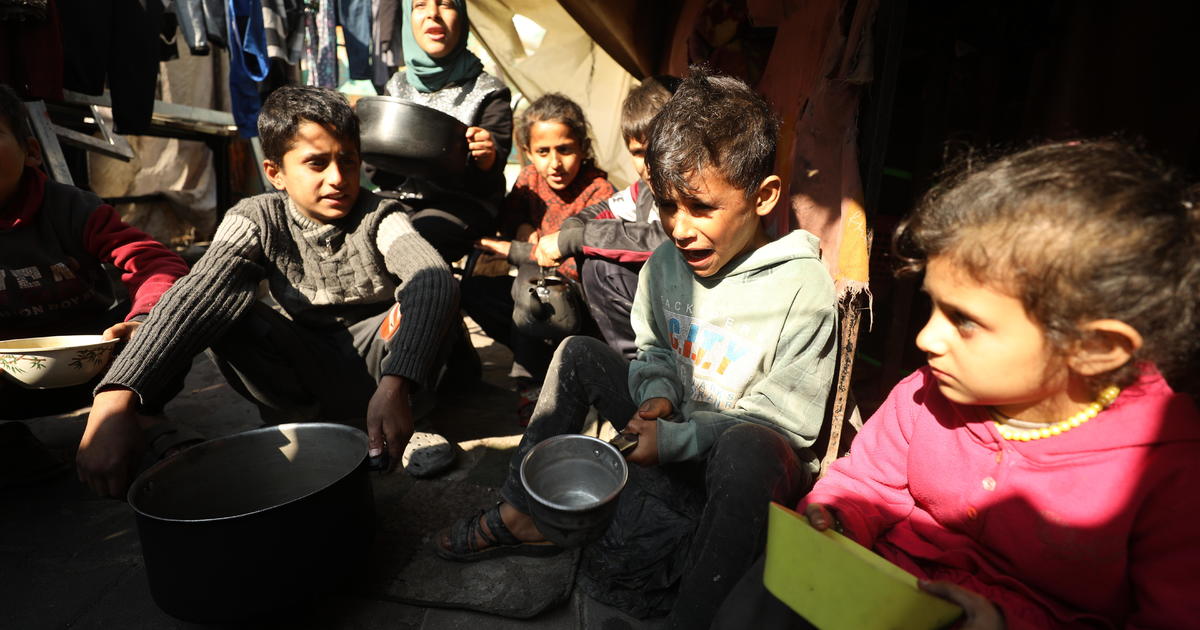On the ruins of what was once Gaza’s main coastal road, Palestinians displaced by months of intense fighting as Israel battles to destroy Hamas were on the move again Tuesday. This time, they were looking for food.
Across the decimated Gaza Strip, starvation has become so acute that the Jordanian military has taken to airdropping rations. Videos posted online Tuesday showed hundreds of desperate Palestinians crowding a beach as packages fell into the water not far from the shore.
Reuters
U.N. official says Israel “intentionally depriving people of food”
According to the United Nations, the amount of aid reaching the Palestinian territory, which was ruled for almost two decades by Hamas before the brutal Oct. 7 terrorist attack on Israel, which sparked the current war, dropped by 50% in February compared to the previous month.
The dire circumstances have led the U.N.’s special rapporteur on the right to food, Michael Fakhri, to condemn Israel for what he said was an intentional and illegal bid to starve Palestinian civilians in retaliation for the Hamas attack.
Dawoud Abo Alkas/Anadolu/Getty
“There is no reason to intentionally block the passage of humanitarian aid or intentionally obliterate small-scale fishing vessels, greenhouses and orchards in Gaza — other than to deny people access to food,” Fakhri told British newspaper The Guardian in an interview published Tuesday.
“Intentionally depriving people of food is clearly a war crime,” he said. “In my view as a U.N. human rights expert, this is now a situation of genocide. This means the State of Israel in its entirety is culpable and should be held accountable, not just individuals or this government.”
Israel has vehemently rejected accusations — including a case brought by South Africa at the U.N.’s highest court — that its actions in Gaza constitute genocide. It’s government and military insist that the war is against Hamas, not Palestinians, and that all possible measures are taken to avoid harming civilians.
But the Israel Defense Forces are still preparing for a ground offensive in the southern city of Rafah, where an estimated 1.5 million displaced people have sought shelter from the war. The U.S. and many other nations and organizations have warned that a ground offensive in the densely-packed city could lead to a serious increase in civilian casualties.
Israel “increasingly isolated” as U.S. pushes for cease-fire
There has been no official comment from Israel’s government on President Biden’s suggestion Monday that a six-week Gaza cease-fire and hostage release deal could be reached as soon as this week.
The White House has made it clear that it wants a deal struck before the Islamic holy month of Ramadan begins on March 10, but Israeli media reports suggest Prime Minister Benjamin Netanyahu may try to quash any agreement. He’s said repeatedly that Israel will continue its war until Hamas is completely dismantled in Gaza, including four combat units he says the group still has in Rafah.
Dahlia Scheindlin, a political analyst and author of “The Crooked Timber of Democracy in Israel,” told CBS News that Netanyahu “likes to make a show of showing that he can stand up to the Biden administration.”
But she added that, “ultimately, America’s the real ally Israel can depend on,” and she said Netanyahu’s government “can’t ignore it entirely.”
“Netanyahu has no choice but to consider the Biden administration’s wishes,” she said. “The Biden administration gave him what, you know, many see as a blank check, right? Basically giving Israel political cover… vast economic support and military support.”
But Scheindlin said that support was changing, and the White House has started to pressure Israel “in small and incremental ways, to express that it’s prepared to use policy to pressure Israel to change its policies.”
She said the pressure was slowly shifting from back channel requests for changes in Israel’s military operations, to more public warnings, and lately even measures with real impacts, such as “announcing sanctions on a very limited number of violent settlement settlers, which sends a message.”
She also noted the change in rhetoric that came just last week, when Mr. Biden’s top diplomat declared the settlements in the Israeli-occupied West Bank to be “inconsistent with international law.”
She said the mounting pressure “can genuinely affect what Israel can and can’t do and, of course, they send a major signal that Israel is endangering its relationship with its best ally.”
Noting that many European nations were “very uncomfortable with the way this war is going,” she said Israel was “increasingly isolated on these issues.”










